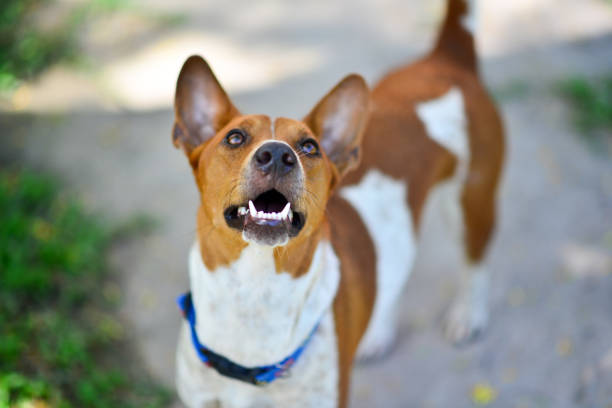The first step to address excessive barking is identifying what triggers the behavior. Punishing your dog through yelling or using a shock bark collar or citronella collar doesn’t address the root cause and can actually be quite distressing for your dog.
Territorial/protective barking is typically triggered by people or animals approaching or entering your dog’s territory. This type of barking is often accompanied by aggressive body language.
1. Train Your Dog
For short-term barking problems like greeting or alarm barking, try distracting your dog with a treat, toy or game of tug of war before they start. This removes them from the trigger, teaches them to be calm and quiet, and reinforces that calm behavior is rewarded. For longer-term issues, such as territorial or protective barking, you can use desensitization techniques to teach them that the people, animals and objects they are barking at are safe. This involves recording the noises that trigger the barking, playing them very quietly at first and then gradually increasing the volume, rewarding them with food if they remain silent, and slowly moving closer to the sound.
In some cases, your dog may be barking because they are looking for attention. This type of barking can be addressed by teaching them a cue, such as “sit,” that you can give them when they are quiet. You can also reward them with attention, such as petting and treats, when they are not barking.
Some dogs may bark at passers-by through windows, so you can help them to calm down by covering the windows with decorative film or furniture, and preventing them from being able to see the outside world. You can also train them to walk calmly past people and other dogs without barking by encouraging them to sit and rewarding them with a treat, and using gentle, positive reinforcement.
2. Reward Your Dog
Barking is a normal part of dog communication, but excessive barking can be annoying for you and your neighbours. It can also be a sign of a deeper issue that requires the help of a professional dog trainer or behaviorist.
If you know what triggers your dog’s barking, you can take steps to prevent them from barking at that particular stimulus. For example, if your dog is always barking at the delivery person or children riding their bikes down the street, try to desensitize them to that stimulus by having them sit and wait with you at a safe distance until they are quiet. Then, gradually get closer while they are still being quiet and reward them with treats and verbal praise.
Rewarding good behaviour is important to prevent barking in dogs, especially if it’s being motivated by excitement. If your dog is excited and barking at something that shouldn’t be, you can redirect them into a positive behavior with some training or by giving them an enriching activity like searching for treats in their snuffle mat or chew toys. Avoid rewarding unwanted behaviors with affection, as this can reinforce them and encourage more unwanted barking.
If your dog is barking due to boredom, provide them with more mental stimulation to refocus their attention. Also make sure they are getting enough exercise and mental stimulation by doing things together like taking them for walks, playing fetch, or working on obedience exercises with them.
3. Create a Quiet Area
Barking can become a problem when it’s constantly happening, disrupting your life and that of your family. The best way to curb this behavior is to create a quiet area in your home and block off areas that may be triggers for excessive barking, such as the front door or window. Use a draught excluder or caulking to seal any gaps, and try hanging a “Do Not Disturb” sign on the door.
Another common reason dogs bark excessively is boredom. If this is the case, make sure your dog gets plenty of exercise and mental enrichment during their day. This can include walks, active playtime, and the use of interactive toys that will keep their mind engaged.
Lastly, if your dog is barking because of frustration, it’s important that you curb your own frustrated energy. Frustrated owners often respond to their dog’s barking by raising their voice and giving them attention, which will only serve to reinforce the behavior.
In many cases, it takes time and practice to get your dog to stop barking in a calmer and more controlled manner. If you find that your efforts are not working, it’s always a good idea to seek out a professional trainer or behaviorist for guidance and assistance. They can help you develop a tailored behavior plan that will address any underlying issues.
4. Change Your Environment
Barking is a normal part of dog communication and they often use it to let their owners know what’s happening outside. However, excessive barking can be very distracting and annoying for everyone in the house.
If your dog is barking in response to noises or people in the neighborhood, try to reduce their exposure to these stimuli by closing window blinds and covering them with tinted film or a screen. You can also try to mask external sounds by using a fan or white noise machine (called sound masking) so they are less stimulated by the noises they hear.
Attention-seeking barking often occurs because of fear or anxiety. If this is the case for your dog, you will want to work on reducing their anxiety and getting them used to being alone. You can do this by letting them engage in play with a Kong or puzzle toy before you go out and gradually increasing the amount of time they spend playing with it.
If your dog is barking to get you to notice them, stop responding to their behavior when they start barking. This will help reinforce the quiet behavior and teach them that barking won’t get them what they want. Instead, if they need you to notice them, give them a pat or a treat when they are quiet.




